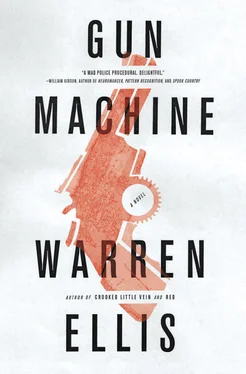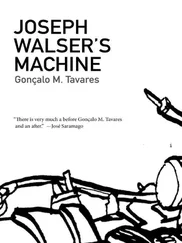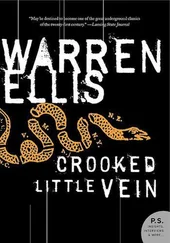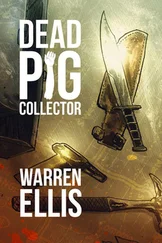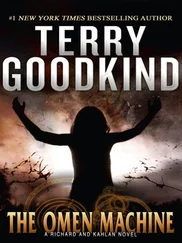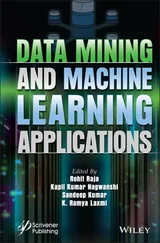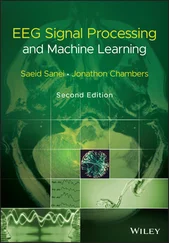“What?”
“Well, the skin grafts took, but, you know, he basically made napalm, so there wasn’t much left under it. So they injected him with this weird sort of facial caulking that swells and firms up under UV light and essentially kind of re-inflated his head. It was cool.”
“Oh! And the old still exploded last summer!”
“Right! Did you see Foley’s legs the other day when he was doing that fucked-up pantsless lap of victory around the main labs? Legs like a dead giraffe.”
“Downstairs?” said Tallow, with just a little pleading in his voice.
Downstairs was cavernous: bare and stained cement, gray pillars holding up a blackened ceiling that had broken-down flotillas of fluorescent light tubes sailing across it in lazy waves. Walking in from the elevator, Tallow saw an arrangement of wheeled whiteboards, and great blankets of clear plastic sheeting on the floor. Getting closer, he could make out big glossy photos under the sheeting and tacked to the whiteboards.
“Oh my God,” said Tallow.
“Yeah,” said Scarly. “We got into work early. Not that he was much use. We rounded up some help and got it done.”
The CSUs had run off copies of all the photos, in a rough ratio of one to one, and arranged them on the floor and on the whiteboards according to the evidentiary floor plans. The plastic sheeting had been rolled out over the photos on the floor so he could walk over them. It was as close as could be gotten to a copy of the whole of apartment 3A, with the whiteboards standing in for walls and partitions.
There was a table over to one side, with papers scattered on it. Tallow set his iced coffee and his potted plant down there, turned, and surveyed the space. Scarly deposited next to that the things she’d brought from upstairs, excavated out of their office. An old mortar and pestle, a foil tray that’d had fossil grains of rice pilaf wiped out of it with a wet nap that was itself not young, and a small chef’s blowtorch. Tallow was learning not to ask certain kinds of question about the way the CSUs operated.
“This is amazing,” Tallow said, and meant it. He wasn’t just taken aback at how well and how completely and how intelligently they’d done it. He was genuinely shocked that they’d done it at all. Tallow had expected to be down here all morning doing it himself, and he hadn’t been looking forward to meticulously matching photos to floor plans and codes, let alone scavenging CSU offices for tacks and adhesive. Walking around the perimeter of the space, he knew immediately that he couldn’t have done it as well as this. Laying this broad plastic sheeting over the photos on the floor was inspired, and Tallow wouldn’t have thought of that at all.
“What’s the plant for?” asked Bat, bending down and peering at it suspiciously. “I don’t trust plants. Food things come from them.”
“It’s a tobacco plant. I had the idea that I could smell a kind of tobacco in the apartment.”
Bat turned his judgmental squint on Tallow. “This is your much strong cop voodoo.”
“Well,” said Tallow, “we live in hope. But this is really incredible. Thank you so much.”
“You’re welcome.” Scarly grinned. “Would you like to be alone with your plant now?”
Tallow walked into the middle of the simulated living room. “For a couple of hours. Until you get the ballistics back on the Bulldog. Then I’m going to want to talk about paint chips.”
“You wanna decorate?” Bat asked, raising his voice. Tallow was fairly sure he’d spent the past thirty seconds threatening the plant in a menacing whisper.
“I saw paints on things in the apartment. I want to know more about those paints.”
“You sound,” said Scarly, “like a man developing a case.”
“I’m—no. Not yet. I’m a man telling himself a story, right now…”
Tallow found his voice trailing off as he looked around. He didn’t see Scarly and Bat exchange a clever glance, just heard Scarly say “We’ll come and get you” as they both left for the elevator. They were already gone when he turned to thank them again.
He did a first walk of the emulation. There had never been a bed in this apartment, and the kitchen had been ripped out by his man long ago. There was nothing but guns. Looking down, he found the flintlock at the center of a large swirl of weapons. A goat’s eye in the middle of a gunmetal sun.
The CSUs really had done an incredible, ingenious job. Everything was positioned correctly. Walking back into the living room, Tallow got a new perspective. The arc behind the front door had to be, and was, clear of weapons, otherwise the door wouldn’t open. If Tallow stood in the arc, he could see a space close to the middle of the room that could be reached by stepping into what were now obviously two gaps in the gun coverage, each big enough to accommodate a foot.
He tried it. Reached the central space. Sat down in it, cross-legged. The position had him facing the broad wall adjacent to the door. He sat and stared at the wall, hands in his lap. Scanned the mosaic of photos. Fought to see something in them beyond arrangements of guns mounted by a very careful lunatic who had been killing people in Manhattan and getting away with it for ten or twenty years.
Not a thing. Not a thing yet, he told himself, and went to retrieve his coffee. There was no way he could re-create the lighting, he knew, which was a shame. It really had had that churchlike effect on Tallow, standing in that apartment on Pearl Street for the first time. Maybe he could just play a CD of classically inspired ambient music, he thought, and smiled a little at it. Maybe find out the name of whatever Muzak they played in the lobby at Vivicy.
Tallow sat back down in the virtual space on the floor of the simulated apartment, gazed at photographs of murder weapons, and tried to understand where he really was and what they really were.
THE HUNTER awoke gently from a peaceful sleep at the break of dawn, its rosy fingers softly touching his face as he slept beneath a great Central Park cypress by the water. He sat up, cross-legged, silent, breathing deeply as the rising sun warmed him. The hunter then stood, pulled some leaves from the cypress, crushed them in his hand to release their oils, and rubbed them under his armpits to minimize his odor.
Walking quietly around the park, he gathered cattail shoots from the water’s edge, lamb’s-quarter leaves, hen of the woods mushroom flesh, a little mountain mint, and wood sorrel, and he returned to his spot under the cypress to eat it with a piece of squirrel meat. He was always careful never to take too much from one plant. He was a hunter, and that meant he never knew when he might have to rely on foraging to live. The moment he allowed himself to believe that the movement of seasons was perfectly repeating and broadly predictable, he would be creating the conditions for his own death.
Having eaten, the hunter began to walk. He exited Central Park at East Seventy-Second Street.
Within a few minutes, the hunter was where he wanted to be: in sight of the Aer Keep Tower, a forty-four-floor glass spike sunk deep into the island. There was no strobing superimposition of Old Manhattan in his vision now. Something this viciously contemporary had him fully impaled in the present day.
The building repulsed him on a basic level. Nothing about it came from nature, not its alien glitter nor its computer-generated shape. It was a thing created in a lab. It had no place in his green world. It was the device of an invader.
He walked its perimeter. It was surrounded by high concrete walls, an urban blast bunker against the visual assault of the nearby public school, far too charmless and real for the unprotected eyes of the tower’s inhabitants. The residents’ view didn’t start until higher up, where all the adjacent streets and buildings became nothing but distant pretty toys laid out around their feet. The comfortable perspective of giants.
Читать дальше
